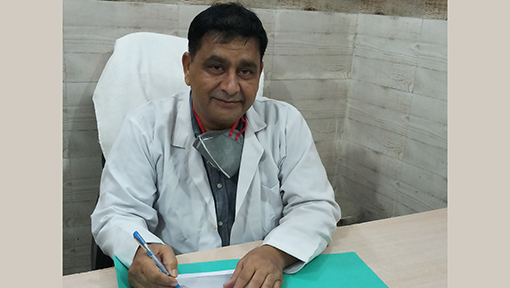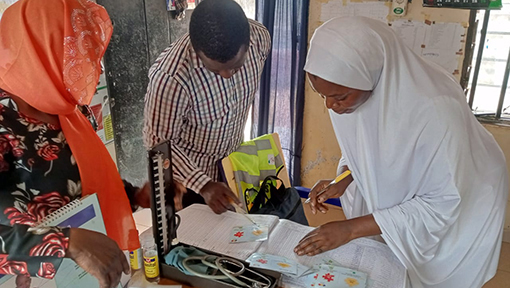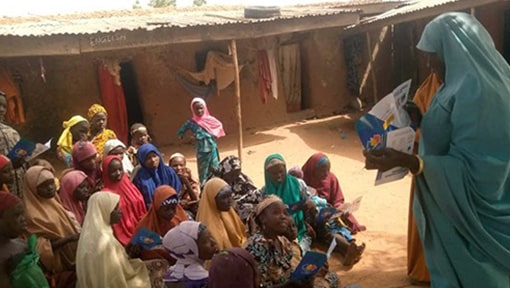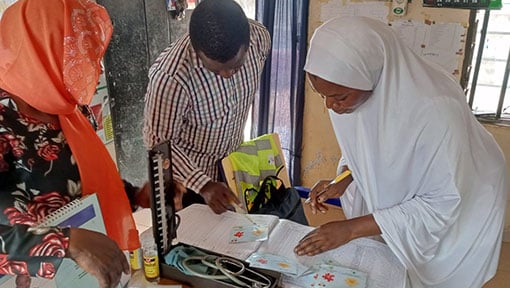TCIHC Urban Tales: Prioritizing Health Care Workers and Client Safety in Muzaffarnagar During COVID-19
Contributors: Komal Ghai and Parul Saxena
The following story is part of a series from The Challenge Initiative for Healthy Cities (TCIHC) called “Urban Tales,” occasional real-life stories of women and girls benefiting from TCIHC’s work supporting local governments to implement evidence-based family planning and adolescent and youth sexual and reproductive health (AYSRH) solutions.
Dr. Rajeev Niga left early one morning back in June 2020 for his job as Nodal Officer for Family Planning & Immunization in Muzaffarnagar city, Uttar Pradesh. On his way, he looked out at the deserted road from his car and thought about how COVID-19 had made life an emergency drill for medics and community health workers in his city, throughout India and around the world. These thoughts left him feeling overwhelmed but also renewed his focus and commitment to the health care staff in his city.

Dr. Rajeev Nigam is the Nodal Officer for Family Planning & Immunization in Muzaffarnagar city.
He shared his reflections from that morning recently with The Challenge Initiative for Healthy Cities (TCIHC):
Although services had resumed at the urban primary health centers (UPHCs), the safety of the service providers, field-level workers and community is still a big challenge. The situation could be overwhelming to think about but then I remind myself that COVID-19 is a shared challenge. And, I’m proud that I can be of service to my community in this time of need.”
When he reached the Sarwat UPHC in Muzaffarnagar city, he felt an immediate need to motivate his staff as he felt that they must be experiencing similar feelings. He later mentioned this concern to the TCIHC team, who coached him on the benefits of holding monthly review meetings with facility staff, including monthly meetings with Auxiliary Nurse Midwife (ANMs) and Accredited Social Health Activists (ASHAs). These monthly meetings are a TCIHC best practice that have been adopted by the Uttar Pradesh state government. Dr. Nigam immediately put this best practice into action:
We conducted UPHC level meetings with facility staff, ANMs and ASHAs. We told them that this is the time when the community needs us the most. We have to provide services to everyone by taking all safety measures as we do not know whether someone is infected or not. We reinforced the importance of using face masks during their service hours, avoiding touching one’s face, washing hands frequently with soap and maintaining two meters distance at all times while dealing with clients in the UPHC.”
During a recent ASHA-ANM meeting, he continued to reiterate and reinforce COVID-19 prevention strategies:
During household visits, [ASHAs should] inform people that their safety is our priority and that all safety measures are being implemented in the UPHCs towards ensuring safe health care services, including safe IUCD and Antara services.”
Dr. Nigam concluded that meeting by distributing reusable masks, gloves and soap to ASHAs and ANMs provided by TCIHC. These regular ASHA-ANM meetings ensure that everyone is not only counseling the community on safety measures but also modeling the behavior that they wish to see. Dr. Nigam explained:
All service providers wear face masks, gowns, gloves and cover their head while providing clinical family planning services – IUCD insertion and dispensing Antara injectable. In case of any doubts about a patient being infected or not (with COVID-19), the service provider conducts a rapid antigen test and provides clinical services while awaiting the results of the test, which come back within half an hour.”
Dr. Nigam believes strongly that family planning services cannot be stopped during COVID-19 when they are needed the most. In fact, he has reminded his staff to inform clients who want permanent methods that they are still available in the district hospital, and can be performed after testing for COVID-19.
Dr. Nigam’s commitment to his staff’s safety and the safety of the community is commendable. He understands the value of holding regular meetings with staff at the UPHC to truly listen and hear their concerns and encourage them to remain steadfast in adhering to the safety measures. Due to the combined efforts of Dr. Nigam and his team, the four TCIHC-supported UPHCs of Muzaffarnagar continue to regularly provide family planning services, including clinical methods.






